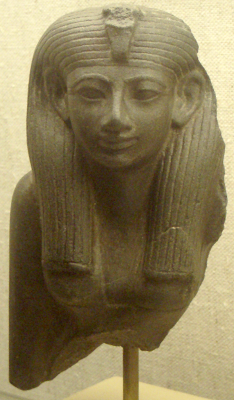Variety reports that John Milius, co-creator of the HBO series Rome (a feature-film version of which is still in active development, by the way), has signed on to produce another ancient-history series called Pharaoh:
Like “Rome,” “Pharaoh” homes in on one dramatic period: the New Kingdom that began in 1479 B.C. with the reign of Queen Hatshepsut, a rare female pharaoh, who ruled as regent until her nephew, Thutmosis III, took the throne.
The mighty warrior pharaoh created the largest empire ancient Egypt had ever seen, an international super-power sprawling from southern Syria to northern Sudan.
This is very interesting to me, as I read quite a bit about Hatshepsut (pictured above) and Thutmose III when I was 14 years old, as research for a “novel” that I wrote back then about the early years of Moses’ life. Most fictionalizations of Moses’ life have linked it to the reign of Rameses II, who lived in the 1200s BC; but at the time, I was persuaded that Moses had lived a couple hundred years earlier than that, and I even toyed with the idea that Hatshepsut herself had been Moses’ adoptive mother.
I don’t subscribe to those theories any more, and I certainly don’t expect this new series to go in that direction, but I am still kind of excited by the possibility that this rather obscure part of Egyptian history (obscure from a pop-culture perspective, that is) may finally be getting some dramatic attention.
For a better sense of what the series will be about, here is another excerpt from the Variety story:
“Pharaoh,” like “Rome,” will mix “characters at all levels of life,” says Milius, historical and fictional figures, common people with which audiences can identify.
One will be a tomb-robber, Milius suggests, others a priest, soldiers and merchants, says Sichler.
Milius believes today’s auds will identify with much of the ancient Egyptian lifestyle.
“Egyptian civilization is remakarbly modern. Egypt’s dealings with other powers, the Syrians, Metannites, Babylonian civilizations, are strikingly contemporary in their arguments, their distrust for each other, their building up of separate cultures,” he says.
“Pharaoh” stands apart in some ways from “Rome,” however.
“What’s important in Egypt compared to Rome is the mysticism, the relationship to death, mummification, to life after death,” says Sichler.
Sounds fascinating. I’m already looking forward to the DVD and all the inevitable history-oriented bonus features.













